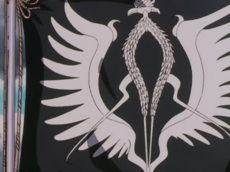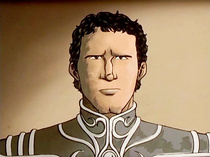Goldenbaum Dynasty
From Gineipaedia, the Legend of Galactic Heroes wiki
The Goldenbaum Dynasty (Japanese: ゴールデンバウム王朝) ruled over the Galactic Empire for 489 years, and all of humanity for 164 of those years prior to the founding of the Free Planets Alliance, through the reigns of thirty-seven Kaisers, or emperors. When the Goldenbaum Dynasty fell in 490 IC (1 NIC / 799 UC / 3599 CE), it was succeeded by Reinhard von Lohengramm's Goldenlöwe Dynasty. The capital of the Goldenbaum Dynasty's government was the planet Odin, with the seat of government located in Neue Sanssouci Palace. Under the Goldenbaum Dynasty, the social hierarchy of the Galactic Empire was rigidly divided between the nobility and peasantry. At the start of his empire, Rudolf von Goldenbaum screened the people for "genetic purity" with the Inferior Genes Exclusion Act. Those he found worthy were admitted into the newly-formed aristocracy and would, through blood right, serve as the ruling class of the Galactic Empire for nearly five centuries. Despite occasional reforms and some popular support for the rulers, the Empire under the Goldenbaum Dynasty was a harsh, totalitarian state. Purges, state executions, and general oppression were the order of the day. Civil rights and liberties simply did not exist, as the Kaiser—and, by extension, the nobility—were imbued with near-absolute power.
The Free Planets Alliance originated as the antithesis of Kaiser Rudolf's and his descendants' ideals, which led to the dynasty presiding over the Alliance–Imperial War, the longest and bloodiest conflict in human history, in an attempt to pacify the 'border rebels' (as they called the Alliance).
At the time of the enthronement of Reinhard von Lohengramm after the abdication of the last Goldenbaum monarch, many of the secrets involving various court struggles and other intrigues that Rudolf's descendants had engaged in and had been classified as state secrets, were brought to light following the fall of the dynasty. Kaiser Reinhard's minister of education, Professor Seeferd, was tasked with overseeing the compilation of an official history of the Goldenbaum Dynasty that included some of the aforementioned declassified information.
Contents |
History
Rise of Rudolf
- "Until Rudolf von Goldenbaum got his hands on power, even if he was rather self-righteous, perhaps he was no more than a reformer burning with ideals and conviction. That changed completely once he had authority. He travelled the road from simple self-affirmation to self-deification."
- – Free Planets Alliance Secretary of the Treasury, João Rebelo (LOGH: 'War Without Weapons')
The Goldenbaum Dynasty had its origins in the Galactic Federation, a republic that saw the rise of a young conservative and highly charismatic politician in an era of decadence and instability. Promises of restoring order and efficiency were well received by the weary public, tired of the debauchery and crime that went on unchecked, who granted Rudolf von Goldenbaum more and more power to fix their problems. The former Galactic Federation Armada officer who had played a key role in pacifying major criminal gangs during the Pirate Wars was viewed as a hero and quickly rose to high offices in the government. Starting out as a Galactic Parliament senator in 296 UC (3096 CE), and in 306 UC (3106 CE) had become the 'President for Life' before finally proclaiming himself Galactic Emperor in 310 UC (1 IC / 3110 CE). This was followed with the abolition of the Federation and its replacement by the Galactic Empire, beginning as year one of the new Imperial Calendar. Thus the Goldenbaum Dynasty was born. (LOGH: 'Julian's Journey, Mankind's Journey')
Initially, Rudolf's ascension to the throne was widely supported by the citizenry, who welcomed his reforms that increased government efficiency and punished corrupt officials, while his measures also swept away the degeneracy that had plagued society. But this began a wave of repression and increasingly draconian laws from the new Imperial government. Finally, he abolished the Imperial Senate in 8 IC (317 UC / 3117 CE) after their resistance to his latest legislation proposal. The Inferior Genes Exclusion Act became the most infamous example of the terror and oppression that would be said to largely characterize Goldenbaum rule by future historians, which was decreed in 9 IC (318 UC / 3118 CE). It was a eugenics project aimed at increasing humanity's vitality by eliminating 'unfavorable' genetic traits from he gene pool, and would result in billions of deaths over the next several years. At its heart, the Inferior Genes Exclusion Act was a policy of forced sterilization directed at people deemed to be abnormal or inferior. This included the poor and the handicapped. People considered to be mentally ill were summarily executed. Eventually, having a family member that was subject to IGEA became a shameful, embarrassing thing, and even those who would have survived under the law—primarily the handicapped—would often be smothered by their parents in infancy. (LOGH: 'Julian's Journey, Mankind's Journey')
The Ministry of the Interior, and more specifically the infamous Department of Social Discipline—which would become another major symbol of the tyrannical power of the Goldenbaum Dynasty—was tasked with carrying out the implementation of the law. In addition to those that were considered genetically inferior, many protestors who attended anti-government rallies or made other demonstrations were arrest, tortured, and executed by the millions. Others had their citizenship revoked by the ultraconservative regime and were sent to labor camps, or sold into serfdom. No proof was necessary and trials became history. The Social Discipline Department would from then on serve as a tool for going after political opponents, and after the death of department director Ernst Falstrong at the hands of republican terrorists, Rudolf had twenty thousand people executed as "conspirators". Another major feature of the Goldenbaums' rule was established by Rudolf in 9 IC (318 UC / 3118 CE), the new social structure of the Empire, which was led by the high nobility. The new aristocracy would come to control much of the wealth and territories of the new Empire, consisting largely of Caucasian people with Germanic names. They were chosen by Rudolf as a repayment for their loyalty to him. (LOGH: 'Julian's Journey, Mankind's Journey')
Rudolf the Great, as he would become known, died in 42 IC (351 UC / 3151 CE) and left no male heir as his son had actually been born with a birth defect. However, he had everyone involved in the birth killed off to keep it a secret that Kaiser Rudolf had produced an heir that was genetically inferior by his own standards, and thus the son of his eldest daughter would succeed him as Kaiser Sigismund I, second emperor of the Goldenbaum Dynasty. (LOGH: 'Julian's Journey, Mankind's Journey')
Early Goldenbaum era
The death of Kaiser Rudolf had kicked off massive anti-Imperial uprisings throughout the Empire, however by then the Imperial government and the new dynasty were too well entrenched to be overthrown. The new emperor's father, Prime Minister Joachim von Neue Stauffen, oversaw the defense of the government from the insurgents. His calm and collected leadership allowed the Galactic Empire to survive through that period. The quelling of the insurrection led to the deaths of four million people, but it was ultimately successful. Many millions more, family members of the rebels, were forced into serfdom. However, Kaiser Sigismund secured the foundation of the Empire by granting rewards and special privileges to his loyal supporters throughout his reign. The reign of Sigismund's successor, Richard I, was much more peaceful, and he was able to enjoy the pleasures of life and remained aloof from politics. His successor Otfried I was largely uninterested in any change or reform and maintained the Imperial state, but was heavily influenced by his chief of palace affairs, Viscount Eckhart. The man came to control the government through the Kaiser until the reign of Otfried's son, Kasper. His successor was a homosexual (noted for being an ironic twist of history as Rudolf had purged homosexuals), and so Kaspar refused to marry Eckhart's daughter. This enraged him and he attempted a coup, only for it to fail and for Eckhart to be killed. Kaspar himself abdicated from the throne after exactly one year. (LOGH: 'Julian's Journey, Mankind's Journey', 'Past, Present, and Future')
Kaspar was succeeded by Julius, who became the oldest sovereign of the Empire and lived until the age of ninety-five. His crown prince, Franz-Otto, became popular as he had run affairs of state during the reign of Kaiser Julius, died in his seventies and it was thought that the Kaiser, upon his death, would be succeeded by Karl, his great-grandson. However, the one crowned emperor was Sigismund II, formerly the Marquis von Braun. This was because Karl had actually poisoned Kaiser Julius, out of an irrational fear that the man would never die, but information about the plot had been preserved in a bracelet of one of Julius' concubines who collaborated in the murder and was forced to commit suicide by Karl. That bracelet was delivered to her brother, an Imperial Guard officer, who delivered it to Sigismund von Braun, second in the line of succession. He used it to exile Karl and took the throne (most of the events surrounding this were kept as a state secret under Goldenbaum rule). However, Kaiser Sigismund was obsessed with personal wealth and extravagance, nearly bankrupting the Empire as a result of his various excesses and further put Imperial society at the mercy of the high nobles. After passing several laws that punished farmers and merchants by depriving them of their wealth, he was eventually forced into house arrest by Otfried II. (LOGH: 'Past, Present, and Future', Legend of Galactic Heroes Gaiden Volume 1: The Star Crusher: 'Enemy, Friend, Enemy, Enemy, Enemy...', Encyclopaedia Die Legende der Sternhelden)
Kaiser Otfried II began to institute reforms to revert to those made by Crown Prince Franz-Otto back during the reign of Julius, to wipe away the shame of the transgressions of Sigismund II and revive the waning popular support for the dynasty. It was not entirely without bloodshed, as tens of thousands of senior officials and merchants that had unjustly profited under Sigismund II were exiled or executed. While Otfried II only lasted six years on the throne, his successor Emperor August I continued his predecessor's reforms. Despite August's various scandals within Neue Sansoucci, they were largely kept within the palace and he had a dignified public appearance, being regarded as an above average ruler even if still fairly authoritarian. The reigns of the next four emperors were largely uneventful and the next notable one would be August II ("the Bloodletter"), who went completely insane after gaining absolute power. His rule saw the torture and execution of countless officials and normal citizens alike, creating a reign of terror that was eventually ended when his Imperial Guard commander pushed him into a pit of wild animals he had been feeding. The total number of deaths caused by his regime was said to be 6 million to 20 million, and August II had the worst reputation of all of Rudolf's descendents. His successor, Erich II was not particularly talented, but his rule swept away the shadows that had been left by August II. (Legend of Galactic Heroes Gaiden Volume 1: The Star Crusher: 'Enemy, Friend, Enemy, Enemy, Enemy...', Encyclopaedia Die Legende der Sternhelden)
Late Goldenbaum era
The next major event in the dynasty's history would be the Battle of Dagon in 331 IC (640 UC / 3440 CE), which occurred during the reign of Kaiser Friedrich III ("the Defeated"). He succeeded the throne after the death of Leonhard II in suspicious circumstances, and was rumored to be sexually involved with Leonhard's consort, Christine. Emperor Friedrich refused to recognize the recently discovered Free Planets Alliance, formed by refugees who had escaped from a remote penal colony, and sent his third son Grand Duke Herbert at the head of an Imperial expeditionary force to subjugate the rebels. However, the Imperial Fleet had not faced an strong opponent until then, having mostly been used to quell rebellions, and thus they were unprepared for facing the Free Planets Star Fleet. Grand Duke Herbert's force was encircled and destroyed in the Battle of Dagon, which would come to hold legendary status in the history of the Alliance. Thus Kaiser Friedrich presided over the biggest Imperial military defeat since the dynasty's founding, and despite the government's attempts to censor information about the event, the public heard about it and Dagon became a major loss of face for the Goldenbaum family. The battle also caused a mass exodus of various Imperial citizens who sought to become new citizens of the Alliance, although not all of them were believers in republican ideals and included a lot of criminals. (Legend of the Galactic Heroes Gaiden: The Chronicle of the Battle of Dagon)
The subsequent reigning kaisers would preside over the Alliance–Imperial War, which would be the bloodiest conflict in human history and resulted in countless millions of deaths. The Empire instituted military conscription for commoners, and many would perish on the front lines. Kaiser Friedrich III was temporarily succeeded by his half-brother, Maximilian Josef I, who reigned briefly before Friedrich's eldest son in ill-health, Gustav, took the throne and became known as "the Hundred Day Emperor". He was poisoned by a follower of his brother Herbert, who had fallen out of favor since the Dagon debacle, and thus he gave the throne to his brother Maximilian Josef II (the second son of Friedrich III). The new emperor had not expected to be in the line of succession because his mother had been of lower nobility, who were viewed almost as an embarrassment by the high nobles. Maximilian Josef was also half-blind because of poisoning by Herbert's followers, but his reign had proved an enlightened one, sweeping away the corruption that was prevalent during his late father's reign. He also famously stopped enforcing the Inferior Genes Exclusion Act, although it was still technically in effect. For these deeds he came to be known as "the Seer" or "the Rebuilder". (HBSHBL: 'The Night of the Party', Legend of Galactic Heroes Gaiden Volume 1: The Star Crusher: 'Enemy, Friend, Enemy, Enemy, Enemy...', Encyclopaedia Die Legende der Sternhelden)
His successor Kornelias I became known for his attempted invasion of the Alliance. He wanted to wipe away the shame of Friedrich III's defeat at Dagon and also to become known as a great ruler like Maximilian Josef II, who had made advancements in domestic policies. So Kornelias focused on foreign policy, namely the issue of the Free Planets Alliance. He initially sent messengers asking them to surrender three times, only to be turned down by the Alliance politicians still intoxicated by their victory at Dagon. Thanks to extensive preparations, he successfully invaded the Alliance and defeated the overconfident Alliance navy's counterattack. He also became known for his quirk of promoting officers to the rank of Fleet Admiral, of which there were fifty-eight under his reign. However, a palace coup on Odin forced Kornelias to return to the Empire before he could finish his conquest of the Alliance, and due to the strained finances he was never able to mount another expedition against the Alliance. (Legend of Galactic Heroes Gaiden Volume 1: The Star Crusher: 'Enemy, Friend, Enemy, Enemy, Enemy...', Encyclopaedia Die Legende der Sternhelden)
During either the reign of Kornelias, Helmut, or Manfred I, the Imperial government would allow the establishment of a quasi-independent state in the Fezzan Corridor, the Dominion of Fezzan, after intensive lobbying by the Terran merchant Leopold Laap, in 373 IC (682 UC / 3482 CE). The lord of Fezzan was nominally a subject of the Emperor, but was in effect an autonomous leader, and the Fezzan Corridor remained a demilitarized neutral zone that could not be used for war. Another notable chapter in the dynasty's history was the incident would become the brief, one-year reign of Manfred II. A bastard son of Kaiser Helmut, he would flee to the Free Planets Alliance and spend his youth there in exile before returning to take the throne. He made attempts to normalize relations between the Empire and the Alliance but his efforts would be thwarted with his assassination by reactionary nobles, but rumors circulated that the Dominion of Fezzan was really the organizer of his death. Another incident occurred during the reign of Wilhelm II, whose son Albert would end up disappearing for reasons that were never fully clear though thought to be rooted in a power struggle. (LOGH: 'Thunder', 'Julian's Journey, Mankind's Journey', Legend of Galactic Heroes Volume 4: The Plot, Encyclopaedia Die Legende der Sternhelden, Legend of Galactic Heroes Volume 1: Dawn)
Otfried III established the precedent of leaving the post of Prime Minister of the Galactic Empire vacant, since he held the office as Crown Prince and later became monarch. It was considered to be presumptuous for vassals to adopt a post that had been held by a previous ruler. A popular prince, he was thought to make a capable kaiser, but upon gaining the throne he was subjugated to various conspiracies and became extremely paranoid. Thus he ended up dying of starvation after not eating his food out of fear of being poisoned. Years later, Otfried IV would amass thousands of beautiful women and fathered over six hundred children. For nobles marrying his children, the costs of wedding gifts became a significant financial burden. Kaiser Otfried V became known for carefully managing the Empire's money and most significantly oversaw the construction of an artificial satellite in the Iserlohn Corridor, the primary site of battles between the two warring states. This project would run drastically over budget, and the emperor forced the overseer, Count Sebastian von Lüderitz, to commit suicide. However, Iserlohn Fortress would prove to be of major strategic importance in the coming decades. (LOGH: 'Thunder', Legend of Galactic Heroes Volume 1: Dawn, Legend of Galactic Heroes Gaiden Volume 1: The Star Crusher, Legend of Galactic Heroes Gaiden Volume 2: Julian's Iserlohn Diary, Encyclopaedia Die Legende der Sternhelden)
A power struggle occurred when in 452 IC (761 UC / 3561 CE), Crown Prince Richard von Goldenbaum was implicated in trying to poison his father Otfried V, and he was executed. Three years later it was discovered that his brother Clementz von Goldenbaum had framed him, and Clementz was killed in an accident while trying to escape to the Alliance. Thus Otfried V's youngest son succeeded him as Friedrich IV, who would become the last "true" Goldenbaum emperor in the waning decades of the dynasty. (LOGH: 'The Klopstock Incident')
Final years
By the time of the ascension of Kaiser Friedrich IV to the throne, the Empire was largely run by a corrupt and inept government, controlled by high nobles who cared primarily about lineage and personal wealth. Friedrich IV himself was more concerned with personal pleasures than ruling the Galactic Empire, leaving the day-to-day running of the Imperial government to his Minister of State, Klaus von Lichtenlade, and by December 794 UC (485 IC / 3594 CE)—the thirtieth anniversary of the coronation of Friedrich IV—there had been no major domestic accomplishments. A certain level of corruption was tacitly accepted as a "necessary evil" within the state. Imperial court politics had become more unstable, with assassinations, plots, and conspiracies being very common among the upper echelons of society. This would become so prevalent that Richard von Grimmelshausen, a friend and former military aide-de-camp of Friedrich IV, kept a book of blackmail material with incriminating information he had learned about various nobles. The Kaiser was a target of assassination himself in 796 UC (487 IC / 3596 CE) by Marquis Wilhelm von Klopstock, who had been ostracized and banned from court by Friedrich IV for having support his brother Clementz during the power struggle. The rise of the young Reinhard von Müsel through the ranks of the Imperial Fleet during this decadent era would cause contempt and agitation among the high nobles, although Kaiser Friedrich favored him, partly because his sister Annerose von Grünewald became a concubine of the emperor. It was said that Annerose possessed influence over the elderly Kaiser, which the high nobles like Baron Flegel believed was an ill omen for the Goldenbaum Dynasty. (LOGH: 'The Klopstock Incident', 'The Actress Exits', HBSHBL: 'The Sixth Battle of Iserlohn', DUEL: 'Chapter I', TBT: 'Part One')
Around the time that Reinhard had reached the flag officer ranks, in 795 UC (486 IC / 3595 CE), Kaiser Friedrich decided to award him a noble title, a prestigious name from the founding of the Empire—Count von Lohengramm. This further increased the hatred among the high nobles for the "blond brat", a member of lower nobility who grew up in poverty and was not seen as a member of upper society. The two most powerful aristocrats in the Empire at the time, Duke Otho von Braunschweig and Marquis Wilhelm von Littenheim, whose daughters were in the line of succession for the throne, became the leaders in the anti-Reinhard faction. The Kaiser allowed Reinhard to gain military achievements on the battlefield by assigning him to various missions, and after the unsuccessful invasion of the Imperial Territory by the Alliance in 796 UC (487 IC / 3596 CE), Friedrich IV suddenly died from a heart attack. (Overture to a New War, LOGH: 'The Actress Exits', 'New Trends')
The death of Emperor Friedrich marked the beginning of the end for the Goldenbaum Dynasty. Friedrich IV had maintained a balance of power between Duke Braunschweig and Marquis Littenheim, leaving no clear heir-apparent since the death of Crown Prince Ludwig. There were three contenders for the throne by the time of the Kaiser's death: Elisabeth von Braunschweig, Sabine von Littenheim, and Erwin Josef von Goldenbaum II. The former two were grand-daughters of Friedrich IV and had influential fathers while the latter's father was deceased. Thus Minister of State Lichtenlade, to prevent Braunschweig and Littenheim from taking his power, made an agreement with Reinhard to use his military forces, as the civil servant had none of his own, to place the five-year old Erwin Josef II on the throne. This enraged the high nobles, who saw it as a blatant usurpation of the dynasty by the "blond brat" and the opportunistic Lichtenlade, who they believed should have stepped down after the death of Kaiser Friedrich. Thus a clash became inevitable. In the Imperial Civil War that broke out, the Braunschweig–Littenheim alliance was defeated by the Lohengramm–Lichtenlade axis. Although the nobles technically rebelled against the government, it was widely seen as a fight between the old regime's hardline loyalists, the high nobles, and the reformist forces represented by Reinhard. Most, but not all, high nobles sided against Reinhard during the conflict, and were defeated due to their own incompetence and arrogance in a series of almost uninterrupted military successes by Reinhard's forces. Braunschweig and Littenheim were both killed. Soon after, his subordinates returned to Odin and arrested Lichtenlade on false charges of planning to murder Reinhard von Lohengramm, eventually forcing him to commit suicide. (LOGH: 'New Trends', 'The Lippstadt Conspiracy', 'Courage and Loyalty', 'The Fall of Goldenbaum', 'Farewell, Distant Memories')
The fall of both the high nobles and Lichtenlade left Duke Reinhard von Lohengramm as the most powerful authority in the Galactic Empire, in the formerly taboo position of Imperial Prime Minister, and Emperor Erwin Josef II was essentially his puppet. The young Imperial dictator did not formally abolish the Goldenbaum monarchy after the civil war but began instituting numerous political, social, and economic reforms. The nobility had also lost its special status under his new government and numerous civil rights were introduced to the state which would have been unthinkable a couple of years before. Thus while the Goldenbaum Dynasty remained in power in name, its foundations were swept away. A scheme organized by the Fezzani to prolong the war between the Empire and Alliance and monopolize the economy after Reinhard's unification of the galaxy saw a couple of civil war veterans, Alfred von Landsberg and Leopold Schumacher, kidnap the child kaiser and take him to the Alliance, where with the cooperation of surviving high nobles they established a "Galactic Empire Legitimate Government". The project was essentially the last gasp of the Goldenbaum Dynasty's supporters, as it fell in 799 UC (1 NIC / 490 IC / 3599 CE) after Reinhard's invasion of the Alliance. Following the kidnapping of Erwin Josef II, Reinhard installed the eight month-old Katharin Kätchen as the first kaiserin of the Empire, as well as its 38th and last monarch (her legitimacy continued to be contested by Erwin Josef II, as the head of state of the "legitimate" government-in-exile). (LOGH: 'First Battle', 'Determination and Ambition', 'Thunder', 'The Abduction of the Young Emperor', 'The Arrow Is Released', 'Operation: Ragnarök', 'Long Live the Emperor!')
The dynasty's five century-long history ended on 20 June 490 IC (1 NIC / 799 UC / 3599 CE), shortly after the successful invasion of the Alliance, when Katharin Kätchen's regent Jürgen Offer von Pegnitz signed a letter of abdication which ceded her position to Reinhard von Lohengramm. (LOGH: 'Long Live the Emperor!')
Legacy
By the end of its existence the very name of the Goldenbaum Dynasty became synonymous with tyranny, despotism, and corruption, essentially the worst aspects of a dictatorship, as far as Alliance admiral Yang Wen-li was concerned. It had become an example of a democratic system producing the most undemocratic regime, as Yang described it. Any positive contributions made by its more enlightened monarchs were considered to have been largely overshadowed by the tens of billions of deaths that Goldenbaum rule had resulted in. The result of these abuses was the creation of the Free Planets Alliance, as the antithesis of Rudolf the Great's ideals. While the Imperial people came to despise the nobility, Rudolf had initially possessed widespread support, although much of it dissipated over the course of the dynasty's history. Nonetheless a significant amount still continued to support the Goldenbaums, including most infamously the high nobles, even in its final years. The Westerland Massacre during the Lippstadt War, a nuclear attack ordered by Braunschweig, had largely eliminated any popular support it still had throughout the Empire. The fact that the Goldenbaum Dynasty and the Galactic Empire were no longer monolithic in its final year, as the nobles' government-in-exile was allied to the Alliance as a result of Fezzani scheming, reflected poorly on the administration of Job Trunicht, the Alliance's penultimate head of state.
After the fall of the Alliance government to Reinhard's forces, the leaders of the government-in-exile were arrested and their prime minister Jochen von Remscheid committed suicide. Erwin Josef II disappeared with his two "caretakers" (kidnappers), and although High Admiral Willibald Joachim von Merkatz—a famous soldier, tactician, and loyalist of the old regime—had made it his goal to find the young Kaiser and restore the Goldenbaums, it did not occur before his death in battle. In 800 UC (2 NIC / 491 IC / 3600 CE), a corpse was found with Count Landsberg that was said to be Erwin Josef's but when Schumacher was later captured in 801 UC (3 NIC / 492 IC / 3601 CE), he revealed it was a fake and that the former emperor's whereabouts were unknown to him. (LOGH: 'Long Live the Emperor!', 'After the Ceremony, the Curtain Rises Again...', 'Running Start Towards the Future', 'Dream: To See It to the End'
After his coronation, Kaiser Reinhard of the new Goldenlöwe Dynasty would commission his minister of education Seeferd to write an official history of the Goldenbaum Dynasty. This came to include recently declassified information on the secrets of various Goldenbaum emperors. (LOGH: 'The Kümmel Incident', 'Visitors', 'Past, Present, and Future')
Emperors
| # | Name | Reign |
|---|---|---|
| 1 | Rudolf I (Rudolf the Great) | 1 IC (310 UC / 3110 CE)—42 IC (351 UC / 3151 CE) |
| 2 | Sigismund I | 42 IC (351 UC / 3151 CE)—??? |
| 3 | Richard I | ???—??? |
| 4 | Otfried I | ???—123 IC (432 UC / 3232 CE) |
| 5 | Kasper | 123 IC (432 UC / 3232 CE)—124 IC (433 UC / 3233 CE) |
| 6 | Julius | 124 IC (433 UC / 3233 CE)—144 IC (453 UC / 3253 CE) |
| 7 | Sigismund II (The Foolish) | 144 IC (453 UC / 3253 CE)—159 IC (468 UC / 3268 CE) |
| 8 | Otfried II | 159 IC (468 UC / 3268 CE)—165 IC (474 UC / 3274 CE) |
| 9 | August I | 165 IC (474 UC / 3274 CE)—??? |
| 10 | Erich I | |
| 11 | Richard II | |
| 12 | Otto Heinz I | |
| 13 | Richard III | 2??—247 IC (556 UC / 3356 CE) |
| 14 | August II (The Bloodletter) | 247 IC (556 UC / 3356 CE)—253 IC (562 UC / 3362 CE) |
| 15 | Erich II (The Blood-Stopper) | 253 IC (562 UC / 3362 CE)—??? |
| 16 | Friedrich I | |
| 17 | Leonhard I | |
| 18 | Friedrich II | |
| 19 | Leonhard II | ???—324 IC (633 UC / 3433 CE) |
| 20 | Friedrich III (The Defeated) | 324 IC (633 UC / 3433 CE)—331 IC (640 UC / 3440 CE) |
| 21 | Maximilian Josef I | 331 IC (640 UC / 3440 CE)—336 IC (645 UC / 3445 CE) |
| 22 | Gustav (The Hundred Day Emperor) | 336 IC (645 UC / 3445 CE)—337 IC (646 UC / 3446 CE) |
| 23 | Maximilian Josef II (The Seer, The Rebuilder) | 337 IC (646 UC / 3446 CE)—??? |
| 24 | Kornelias I | ???—359 IC (668 UC / 3468 CE)—??? |
| 25 | Manfred I | |
| 26 | Helmut | ???—398 IC (707 UC / 3507 CE) |
| 27 | Manfred II (The Exiled) | 398 IC (707 UC / 3507 CE)—399 IC (708 UC / 3508 CE) |
| 28 | Wilhelm I | 399 IC (708 UC / 3508 CE)—??? |
| 29 | Wilhelm II | |
| 30 | Kornelias II | |
| 31 | Otfried III | |
| 32 | Erwin Josef I | |
| 33 | Otfried IV (The Passionate) | |
| 34 | Otto Heinz II | |
| 35 | Otfried V | ???—452 IC (761 UC / 3561 CE) |
| 36 | Friedrich IV | 452 IC (761 UC / 3561 CE)—487 IC (796 UC / 3596 CE) |
| 37 | Erwin Josef II | 487 IC (796 UC / 3596 CE)—489 IC (798 UC / 3598 CE) |
| 38 | Katharin Kätchen | 489 IC (798 UC / 3598 CE)—490 IC (1 NIC / 799 UC / 3599 CE) |
Appendices
Apocrypha
The name Goldenbaum means "Golden Tree" in German. There was a former German politician named Ernst Goldenbaum, who was Minister for Land and Sylviculture in the German Democratic Republic.
Background information
The history of the Goldenbaum Dynasty appears to be drawn from a number of historical inspirations, with the rise and reign of Rudolf being a clear parallel of Nazi Germany and Adolf Hitler. However, other aspects seem to be similar to the House of Hohenzollern and its rule in Prussia and Imperial Germany. Others seem to be similar to events that occurred during China's dynastic history. The compiling of an official history of the preceding dynasty by the new ruling dynasty is also a ritual taken from Chinese dynastic history, symbolically ending the previous dynasty and allowing the new dynasty to legitimise its rise to power through writing of the faults leading to the downfall of the previous.
| v•d•e | |
|---|---|
| Rudolf • Sigismund I • Richard I • Otfried I • Kasper • Julius • Sigismund II • Otfried II • August I • Erich I • Richard II • Otto Heinz I • Richard III • August II • Erich II • Friedrich I • Leonhard I • Friedrich II • Leonhard II • Friedrich III • Maximilian Josef I • Gustav • Maximilian Josef II • Kornelias I • Manfred I • Helmut • Manfred II • Wilhelm I • Wilhelm II • Kornelias II • Otfried III • Erwin Josef I • Otfried IV • Otto Heinz II • Otfried V • Friedrich IV • Erwin Josef II • Katharin Kätchen | |










